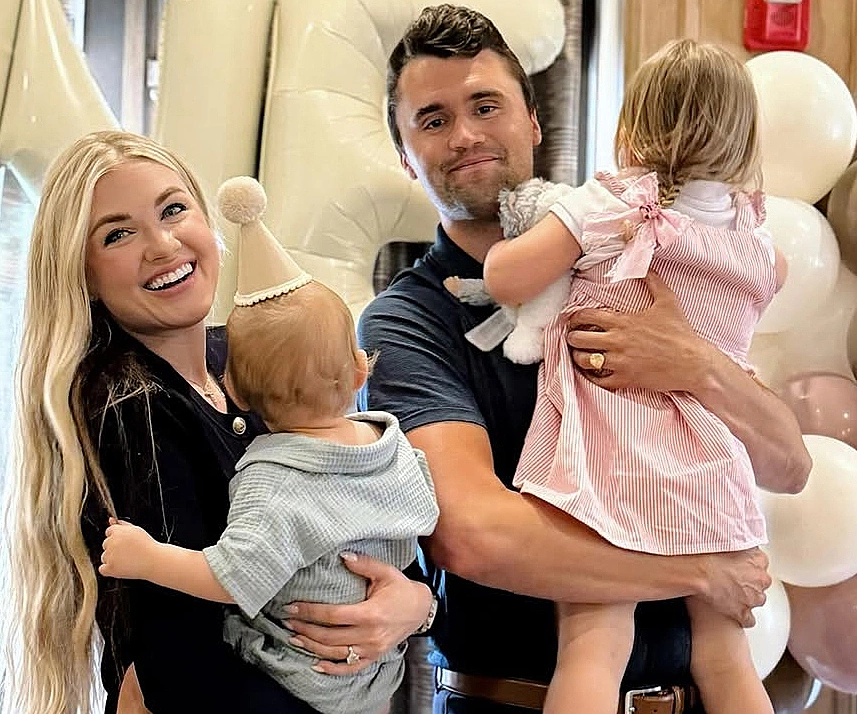One family member, barely able to hold back tears, told reporters:
“Her love for Charlie was infinite. That chair wasn’t empty — it was filled with the weight of a mother’s grief too heavy to bear in public.”
That statement alone captured what many attendees felt but could not articulate: her absence did not signal distance, but depth.
The death of Charlie Kirk — conservative firebrand, media personality, and one of the most polarizing voices in modern America — was already a moment that stunned the nation. But the funeral, which was meant to serve as a collective farewell, turned into an even more gut-wrenching chapter in the story. Amid the tributes, tears, and speeches that highlighted both the controversies and the passions of his life, one absence loomed larger than all others: the absence of his own mother.
For those in attendance, the image was haunting. A seat at the front row, reserved for her, remained empty throughout the service. For a mother to miss her child’s funeral is not just unusual — it is almost unthinkable. In the days that followed, the family released a statement that explained her absence in devastating detail. According to relatives, she is in no condition, physically or emotionally, to endure the weight of such a loss.
The revelation not only broke the hearts of those who followed Kirk’s rise and fall but also touched a raw nerve across the country, forcing Americans to reflect on the fragile, deeply human side of a family so often associated only with political battles.

The funeral itself drew a crowd that symbolized the scale of Charlie Kirk’s reach. Politicians, media figures, activists, and ordinary supporters gathered under one roof. Some came to mourn, others to pay respect, and a few simply to witness history. The atmosphere was tense yet somber. The eulogies touched on his relentless energy, his uncompromising stances, and his ability to mobilize thousands of young conservatives.
But even the most powerful words could not eclipse the emptiness in the front row. Cameras discreetly avoided it, but attendees whispered: “Where is his mother?”
In traditional American funerals, the mother of the deceased often serves as the emotional center, embodying both sorrow and strength. Her presence becomes a symbol of unconditional love, one that bridges the gap between the public figure and the child he once was. The absence of Charlie’s mother robbed the service of that image, leaving behind a silence that spoke louder than any sermon.
When reporters pressed the family, the truth emerged. A close relative admitted:
“She wanted to be there more than anything. But she couldn’t. She is mentally, emotionally, and physically broken. The doctors warned us — it would have been too much. Losing Charlie has shattered her in ways we can’t even begin to describe.”

This confession struck the nation like another death blow. Suddenly, the absence was no longer a mystery — it was a symbol of grief so deep, so paralyzing, that it rendered her incapable of walking through the doors of the funeral home.
Family insiders described how she collapsed upon first hearing the news of her son’s death. Since then, she has been under medical supervision, experiencing what some relatives called “a living nightmare.” Her health, already fragile, deteriorated rapidly after the tragedy.
The Universal Pain of a Mother’s Grief
The absence of Charlie’s mother resonates far beyond partisan lines. In America, where politics often divides families and communities, grief remains universal. No mother should have to bury her child, let alone one whose death has become a matter of public spectacle.
Psychologists often note that parental grief is one of the most devastating human experiences, frequently leading to long-term trauma, depression, and even physical illness. In this case, the mother’s inability to attend reflects not a lack of love, but an excess of it — love so overwhelming that the act of saying goodbye became physically impossible.
Social media captured this sentiment quickly. Hashtags such as #PrayForCharliesMom and #AParentsWorstNightmare began trending within hours of the news. People who had never agreed with Charlie’s politics expressed empathy for his family, sharing personal stories of loss and the unbearable weight of watching a parent crumble under grief.
A Family in Shambles
For the rest of the family, the funeral was a bittersweet ordeal. His siblings, visibly shaken, carried the weight of two roles: mourning their brother and explaining their mother’s absence. In tearful speeches, they asked mourners to keep her in their prayers, emphasizing that her silence was not abandonment but devastation.

Symbolism and Public Perception
The absence of Charlie’s mother has already become a symbolic detail in the larger narrative surrounding his death. For his critics, it underscored the high personal cost of political fame. For his supporters, it became a rallying point for compassion, a reminder that behind the fiery rhetoric and controversies, there was a man who was loved deeply by his family.
In America’s media-saturated culture, funerals of public figures often blur the line between personal mourning and national theater. The empty chair became a visual metaphor, raising questions about how grief is consumed, reported, and politicized. Commentators noted that while the public analyzed Charlie’s political impact, the rawest form of tragedy — a mother’s inability to say goodbye — cut through the noise, offering a rare moment of shared humanity.
The Broader Cultural Impact
Charlie Kirk’s death and his mother’s absence from the funeral may mark a turning point in how America engages with the private lives of public figures. For years, Kirk was defined by controversy, debate, and confrontation. In death, however, the narrative has shifted. The focus is no longer solely on his political footprint but also on the intimate, painful realities his family now faces.
This shift mirrors a broader cultural pattern: when tragedy strikes, even the most divisive figures are reframed through the lens of family and humanity. The absence of his mother has become a story in itself — not because it overshadows his life, but because it highlights the universal truth that grief knows no politics.

Looking Ahead: What Happens Next
For now, the Kirk family has retreated from the spotlight, prioritizing privacy and healing. Insiders say that Charlie’s mother will require long-term care, both medical and psychological, as she struggles to process the loss. Supporters have organized prayer vigils, online memorials, and even fundraising efforts to ensure she receives the support she needs.
Meanwhile, political circles continue to debate the implications of Kirk’s death. His absence leaves a vacuum in conservative media, while his critics argue over his legacy. Yet, beyond those debates lies a story that is far more raw, far more devastating: a mother who could not say goodbye.
Conclusion: A Grief America Cannot Ignore
The story of Charlie Kirk’s funeral is not just about a controversial political figure. It is about the enduring, universal heartbreak of a mother’s love crushed by loss. Her absence, though physical, was not a void — it was a presence that lingered over the service, a silent reminder of the unbearable weight of grief.
In a nation divided by politics, that single truth transcended party lines. For one moment, America was united — not in ideology, but in compassion for a family torn apart and a mother too broken to stand at her son’s grave.
Her absence will remain the most haunting image of Charlie Kirk’s funeral. And perhaps, in that silence, lies the clearest message of all: behind every public figure is a family whose pain is as private as it is profound.